| 1st MONTH
正月
(February 4/5)
LUNG |
Lichun 立春
(Beginning of Spring)
(315°)
Yushui 雨水
(Rain Water)
(330°) |
- Dongfeng jiedong 東風解凍 (The East Wind Liberates From Icy Shackles)
- Zhechong shi zhen 蟄蟲始振 (Hibernating Insects Begin to Stir)
- Yu shang bing 魚上冰 (Fish Rise Up to the Ice)
- Ta ji yu 獺祭魚 (Otters Sacrifice Fish)
- Hongyan lai 鴻雁來 (Swan Geese Appear)
- Caomu mengdong 草木萌動 (Vegetation Sprouts)
|
| 2nd MONTH
二月
(March 5/6)
LARGE INTESTINE |
Jingzhe 驚蟄
(Awakening of Insects)
(345°)
Chunfen 春分
(Spring Equinox)
(0°) |
- Tao shi hua 桃始華 (Peach Trees Begin to Blossom)
- Canggeng ming 倉庚鳴 (Orioles Sing)
- Ying hua wei jiu 鷹化爲鳩 (Hawks Transform Into Cuckoos)
- Xuanniao zhi 玄鳥至 (Swallows Arrive)
- Lei nai fasheng 雷乃發聲 (Thunder Starts Resounding)
- Shi dian 始電 (Beginning of Lightning)
|
| 3rd MONTH
三月
(April 4/5)
STOMACH |
Qingming 清明
(Clear and Bright)
(15°)
Guyu 穀雨
(Grain Rain)
(30°) |
- Tong shi hua 桐始華 (Tung Trees Begin to Blossom)
- Tianshu hua wei ru 田鼠化為鴽 (Field Voles Transform Into Quails)
- Hong shi jian 虹始見 (Rainbows Begin to Appear)
- Ping shi sheng 萍始生 (Duckweed Begins to Grow)
- Mingjiu fu qi yu 鳴鳩拂其羽 (Cuckoos Flutter Their Wings)
- Daisheng jiang yu sang 戴勝降于桑 (Hoopoes Land on Mulberry Trees)
|
| 4th MONTH
立夏
(May 5/6)
SPLEEN |
Lixia 立夏
(Beginning of Summer)
(45°)
Xiaoman 穀雨
(Minor Fullness)
(60°) |
- Luguo ming 螻蟈鳴 (Mole Crickets Croon)
- Qiuyin chu 蚯蚓出 (Earthworms Emerge)
- Wanggua sheng 王瓜生 (Snake Gourds Grow)
- Kucai xiu 苦菜秀 (Sow Thistles Are in Seed)
- Micao si 靡草死 (Shepherd’s Purses Expire)
- Xiaoshu zhi 小暑至 (麥秋至) (Minor Summer Heat Expires)
|
| 5th MONTH
五月
(June 5/6)
HEART |
Mangzhong 芒種
(Bearded Grain)
(75°)
Xiazhi 夏至
(Summer Solstice)
(90°) |
- Tanglang sheng 螳螂生 (Praying Mantises Are Born)
- Ju shi ming 鵙始鳴 (Shrikes Begin to Sing)
- Fanshe wusheng 反舌無聲 (Mocking Birds Cease to Vocalize)
- Lujiao jie 鹿角解 (Deer Shed Their Horns)
- Tiao shi ming 蜩 (蟬) 始鳴 (Cicadas Begin to Sing)
- Banxia sheng 半夏生 (Pinellia Grows)
|
| 6th MONTH
六月
(July 7/8)
SMALL INTESTINE |
Xiaoshu 小暑
(Minor Heat)
(105°)
Dashu 大暑
(Major Heat)
(120°) |
- Wenfeng zhi 溫風(始)至 (Sultry Winds Arrive)
- Xishuai ju bi 蟋蟀居壁 (Crickets Take Up Residence in Walls)
- Ying nai xuexi 鷹乃學習 (Young Hawks Learn How to Fly)
- Fucao hua wei ying 腐草化為螢 (Decaying Grass Transforms Into Fire Flies)
- Tu run ru shu 土潤溽暑 (The Earth Lies Wet Beneath Sweltering Heat)
- Dayu shixing 大雨時行 (Heavy Rain Falls Intermittently)
|
| 7th MONTH
七月
(August 7/8)
BLADDER |
Liqiu 立秋
(Beginning of Autumn)
(135°)
Chushu 處暑
(End of Heat)
(150°) |
- Liangfeng zhi 涼風至 (Cool Winds Arrive)
- Bailu jiang 白露降 (White Dew Descends)
- Hanchan ming 寒蟬鳴 (Autumn Crickets Sing)
- Ying nai ji niao 鷹乃祭鳥 (Hawks Start to Sacrifice Birds)
- Tiandi shi su 天地始肅 (Heaven and Earth Become Austere)
- He nai deng 禾乃登 (Rice Plants Are Harvested and Presented as Offering)
|
| 8th MONTH
八月
(September 7/8)
KIDNEY |
Bailu 白露
(White Dew)
(165°)
Qiufen 秋分
(Autumn Equinox)
(180°) |
- Hongyan lai 鴻雁來 (Swan Geese Pass Through)
- Xuanniao gui 玄鳥歸 (Swallows Go Back)
- Qunniao yangxiu 群鳥養羞 (Flocks of Birds Stockpile Morsels)
- Lei shi shousheng 雷始收聲 (Thunder Begins to Retract Its Sound)
- Zhechong pei hu 蟄蟲培戶 (Hibernating Insects Reinforce Their Shelters)
- Shui shi he 水始涸(Water Begins to Dry Up)
|
| 9th MONTH
九月
(October 8/9)
PERICARDIUM |
Hanlu 寒露
(Cold Dew)
(195°)
Shuangjiang 霜降
(Hoarfrost Descends)
(210°) |
- Hongyan lai bin 鴻雁來賓 (Swan Geese Come and Stay)
- Jue ru dashui wei ge 爵入大水爲蛤 (Siskins Dive Into the Watery Abyss to Become Clams)
- Ju you huanghua 菊有黃華 (Chrysanthemums Display Yellow Flowers)
- Chai nai ji shou 犲乃祭獸 (Dholes Start to Sacrifice Beasts)
- Caomu huangluo 草木黃落(Vegetation Withers and Defoliates)
- Zhechong xianfu 蟄蟲咸附 (Hibernating Insects Stop Up Their Burrows)
|
| 10th MONTH
十月
(November 7/8)
TRIPLE WARMER |
Lidong 立冬
(Beginning of Winter)
(225°)
Xiaoxue 小雪
(Minor Snow)
(240°) |
- Shui shi bing 水始冰 (Water Begins to Freeze)
- Di shi dong 地始凍 (Earth Begins to Harden)
- Zhi ru dashui wei shen 雉入大水為蜃 (Pheasants Dive Into the Watery Abyss to Become Giant Clams)
- Hong cang bujian 虹藏不見 (Rainbows Stay Hidden and Out of Sight)
- Tianqi shangteng, diqi xiajiang 天氣上騰,地氣下降 (Heavenly Qi Ascends, Earthly Qi Descends)
- Bisai er cheng dong 閉塞而成冬 (All is Shut Up and Has Reached Its Wintry End)
|
| 11th MONTH
十一月
(December 7/8)
GALL BLADDER |
Daxue 大雪
(Major Snow)
(255°)
Dongzhi 冬至
(Winter Solstice)
(270°) |
- Hedan bu ming 鶡旦不鳴 (Spangled Drongos Cease to Sing)
- Hu shi jiao 虎始交 (Tigers Begin to Couple)
- Li tingsheng 荔挺生 (Water Irises Grow)
- Qiuyin jie 蚯蚓結 (Earthworms Congeal)
- Mijiao jie麋角解 (Moose Deer Shed Their Horns)
- Shuiquan dong 水泉動 (Aquifers Churn)
|
| 12th MONTH
十二月
(January 5/6)
LIVER |
Xiaohan 小寒
(Minor Cold)
(285°)
Dahan 大寒
(Major Cold)
(300°) |
- Yan bei xiang 雁北向 (Geese Head North)
- Que shi chao 鵲始巢 (Magpies Begin Nest-Building)
- Zhi shi gou 雉始雊 (Ring-necked Pheasants Begin to Crow)
- Ji shi ru 雞始乳 (Hens Begin to Breed)
- Zhiniao liji 鷙鳥厲疾 (Birds of Prey Act Fierce and Swift)
- Shuize fujian 水澤腹堅 (Rivers and Lakes Are Frozen Within)
|
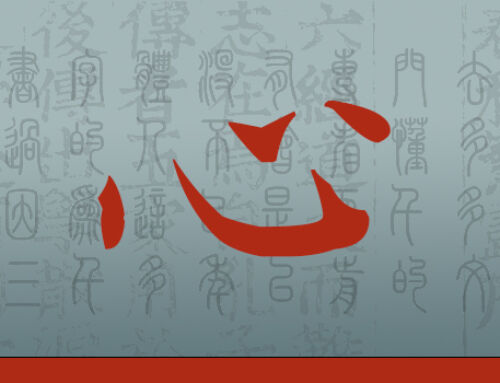
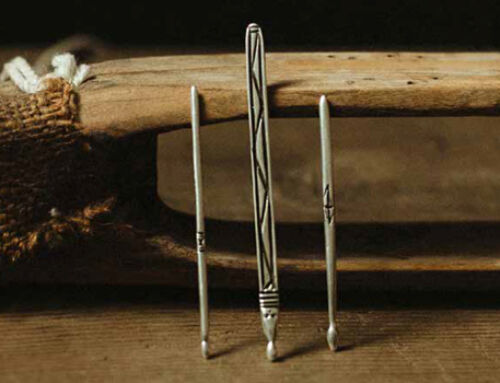
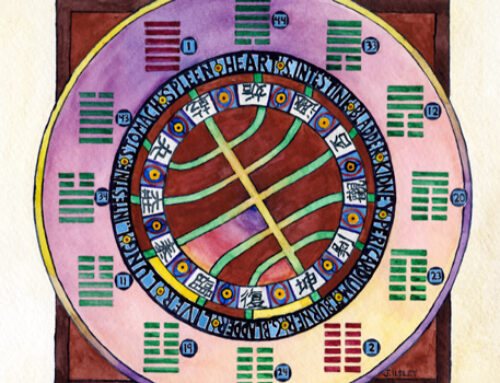


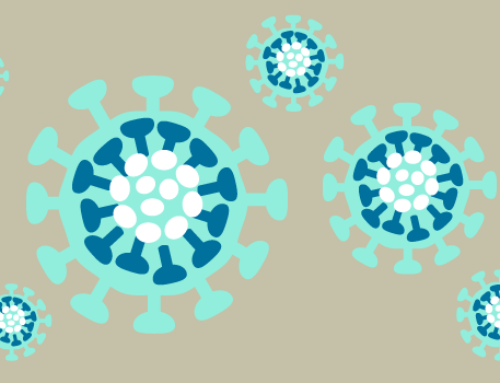

why is the 4th month missing. Is there a significance?
Thanks for noticing the accidental omission, Raymond! The correct information is in the downloadable PDF, and we added it to the post on the page.